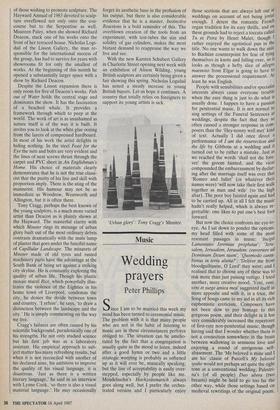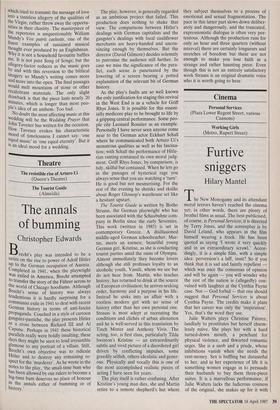M us i c
Wedding prayers
Peter Phillips
Since I am to be married this week my mind has been turned to ceremonial music. The problem with it is that many people who are not in the habit of listening to music are in these circumstances perforce obliged to. The situation can be amelio- rated by the fact that a congregation is usually quite in the mood to listen, indeed after a good hymn or two and a little strategic weeping is probably as softened up as it will ever be, musically speaking; but the line of acceptability is easily over- stepped, especially by people like me. Mendelssohn's Hochzeitsmarsch always goes along well, but I prefer the orches- trated version and I particularly enjoy those sections that are always left out at weddings on account of not being jovial enough. I detest the romantic French organ tradition for its easy thrills, and on these grounds had to reject a toccata called Tu es Petra by Henri Mulet, though I rather enjoyed the egotistical pun in the title. No one wants to walk down the aisle to Bachian counterpoint for fear of tying themselves in knots and falling over, so it looks as though a hefty slice of allegro maestoso from Elgar is going to have to answer the processional requirement. At least he was English. People with sensibilities and/or specialist interests always cause everyone trouble when the easy thing is just to do what is usually done. I happen to have a passion for penitential music. It is not normal to sing settings of the Funeral Sentences at weddings, despite the fact that they so often caused a stronger response in com- posers than the Ifey-nonny well met' kind of text. Actually I did once direct a performance of I am the resurrection and the life by Gibbons at a wedding and it turned out to be rather a mistake. Just as we reached the words 'shall not die fore- ver' the groom fainted, and the vicar compounded the embarrassment by declar- ing after the marriage itself was over that `Romeo and Juliet' (or whatever their names were) 'will now take their first walk together as man and wife' (to the high altar). The poor boy fainted again and had to be carried up. All in all I felt the music hadn't really helped, which is always re- grettable: one likes to put one's best foot forward.
But now the choice confronts me eye-to- eye. As I sat down to ponder the options, my head filled with some of the most resonant passages in music: incipit Lamentatio Jeremiae prophetae'; 'Jeru- salem, Jerusalem, Jerusalem: convertere ad Dominum Deum tuum'; Vuomodo canta- bimus in terra alien?'; 'Deliver me from bloodguiltiness, 0 Lord' they went; and I realised that to choose any of these was to risk more than just passing vertigo. I tried another, more creative mood. 'Veni, veni, veni et surge amica mea' suggested itself as more apposite and with it, in a trice, the Song of Songs came to my aid in all its rich euphemistic eroticism. Composers have not been slow to pay homage to this gorgeous poem, and their delight in it has very considerably increased the repertoire of first-rate non-penitential music; though having said that I wonder whether there is not a connection somewhere in the brain between wallowing in sensuous love and enjoying a round of unrigorous self- abasement. The 'My beloved is mine and I am his' clause of Purcell's My beloved spake would not perhaps set quite the right tone at a conventional wedding; Palestri- na's (of all people) Duo ubera (two breasts) might be held to go too far the other way, while those settings based on medieval rewritings of the original poem, which tried to transmit the message of love into a tasteless allegory of the qualities of the Virgin, rather throw away the opportu- nities in their chastity. The masterpiece of the repertoire is unquestionably William M. undy's Vox patris caelestis, one of the finest examples of sustained musical thought ever produced by an Englishman. Why it is not a household favourite baffles me. It is not pure Song of Songs; but the allegory-factor reduces as the music goes by and with this reversion to the biblical Imagery so Mundy's writing comes more and more into the open. The final passages Would melt mountains of stone or other recalcitrant materials. The only slight drawback is that the piece lasts nearly 20 minutes, which is longer than most peo- ple's idea of an anthem. Too bad. No doubt the most affecting music at this wedding will be the Wedding Prayer that John Tavener has written for the occasion. How Tavener evokes his characteristic mood of timelessness I cannot say: 'one equal music' in 'one equal eternity'. But it is an ideal mood for a wedding.



















































 Previous page
Previous page